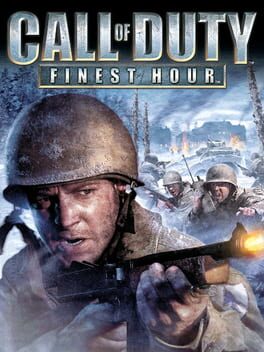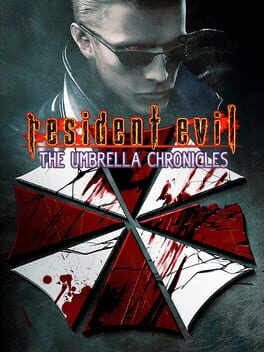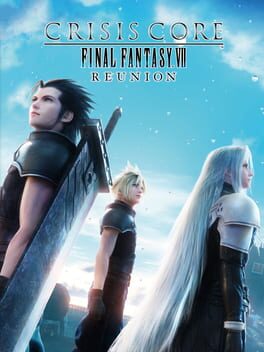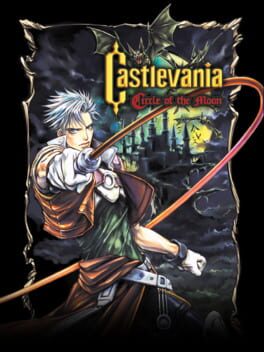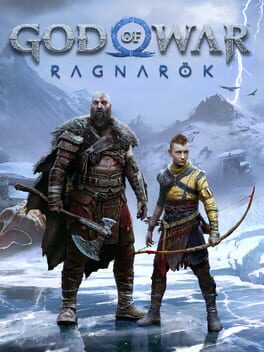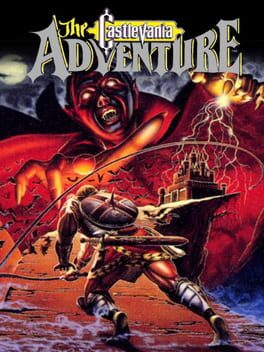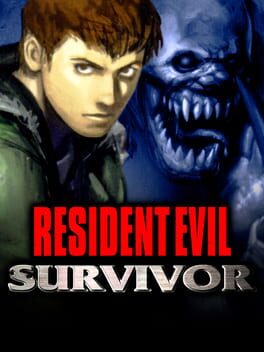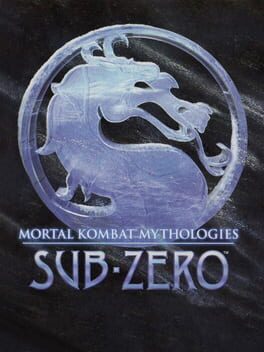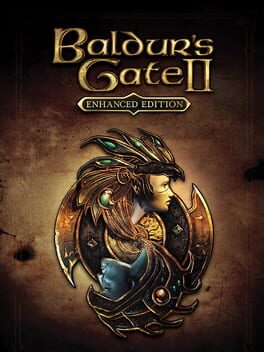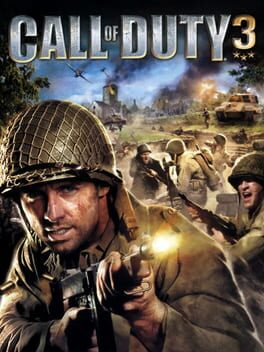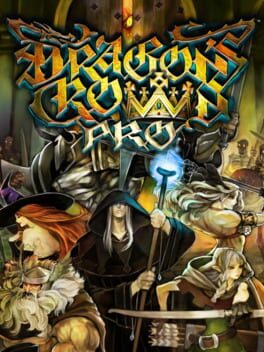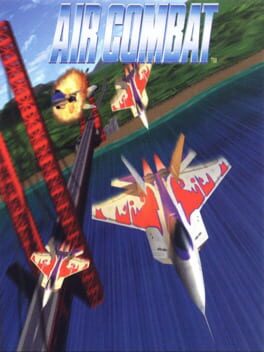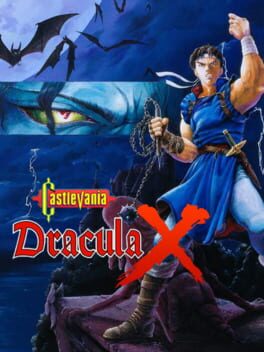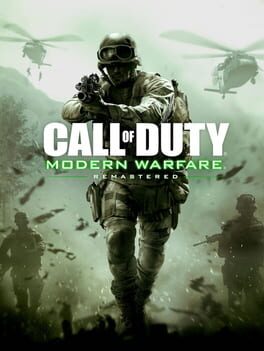theworldisadrag
Some of the cinematic scenes they stole from the PC version are reasonably ambitious for its day, but when you look at the AI, animation, movement and remember that Halo 2 came out the same year, it's harder to be so generous.
Let's get the only good parts out of the way: The Rhine crossing mission rules conceptually and mechanically, and its theme is the cherry on a generally strong score. Unlike its PC brethren, it does make an old college try at writing dialogue intent on character development. Even though the writing overall is worse than its predecessor, it does make the missions feel a little higher stakes and a little more lived in. But that's about all I can say.
The in-engine scenes just do not have the same choreography and composition of its source material. Not to mention, the original has such variety — trench warfare, espionage and infil, daring escapes, sieges. Meanwhile you spend probably 85% of Finest Hour in crumbling buildings or city streets. The North African stretch is a nice touch, but where are the fields? The villages? The snowy forests? At least we have plenty of underground tunnels!
Truly horrible character mobility. The look system has a screwy and floaty dead zone, quite unlike its contemporary console/analog stick FPS cousins, and it feels like you're walking through a swamp. Not to mention getting glued in place if you're being shredded by a buzzsaw MG42 or within 20 feet of a grenade.
The gunplay is where things get really rotten, though. Often I'd have an enemy dead in my iron sights 10 feet away and still miss. Good luck if you need to murk a sniper and you ran out of anything but MP40 ammo. I get it if you want guns to be less accurate to feel more realistic, but if you're going to design a game around that concept, you should probably not also require enemies to take 5-8 bullets to the head before they die on EASY difficulty. I truly couldn't believe how grueling the endgame was. I will say the tank movement and shooting feels relatively fine, but like almost all tank combat in gaming, it is too sluggish and imprecise to really be that exciting. And there is a LOT of tank combat here.
More than a few times, the mission trigger didn't pop and I got stuck, which meant I had to go back to the previous awfully designed checkpoint and often lose like 10-15 minutes of progress. Who designed this? CoD PC is a brutal game, but it at least acknowledges itself and gives you quicksaves and fairly frequent checkpoints.
I'm a big fan of the series and the early PC games had a cinematic quality that make them the definitive WW2 sim experience for their day. But this, this is just cash-in garbage farmed out to a team that either misconstrued or was technologically incapable to deliver what worked so well about the original.
Let's get the only good parts out of the way: The Rhine crossing mission rules conceptually and mechanically, and its theme is the cherry on a generally strong score. Unlike its PC brethren, it does make an old college try at writing dialogue intent on character development. Even though the writing overall is worse than its predecessor, it does make the missions feel a little higher stakes and a little more lived in. But that's about all I can say.
The in-engine scenes just do not have the same choreography and composition of its source material. Not to mention, the original has such variety — trench warfare, espionage and infil, daring escapes, sieges. Meanwhile you spend probably 85% of Finest Hour in crumbling buildings or city streets. The North African stretch is a nice touch, but where are the fields? The villages? The snowy forests? At least we have plenty of underground tunnels!
Truly horrible character mobility. The look system has a screwy and floaty dead zone, quite unlike its contemporary console/analog stick FPS cousins, and it feels like you're walking through a swamp. Not to mention getting glued in place if you're being shredded by a buzzsaw MG42 or within 20 feet of a grenade.
The gunplay is where things get really rotten, though. Often I'd have an enemy dead in my iron sights 10 feet away and still miss. Good luck if you need to murk a sniper and you ran out of anything but MP40 ammo. I get it if you want guns to be less accurate to feel more realistic, but if you're going to design a game around that concept, you should probably not also require enemies to take 5-8 bullets to the head before they die on EASY difficulty. I truly couldn't believe how grueling the endgame was. I will say the tank movement and shooting feels relatively fine, but like almost all tank combat in gaming, it is too sluggish and imprecise to really be that exciting. And there is a LOT of tank combat here.
More than a few times, the mission trigger didn't pop and I got stuck, which meant I had to go back to the previous awfully designed checkpoint and often lose like 10-15 minutes of progress. Who designed this? CoD PC is a brutal game, but it at least acknowledges itself and gives you quicksaves and fairly frequent checkpoints.
I'm a big fan of the series and the early PC games had a cinematic quality that make them the definitive WW2 sim experience for their day. But this, this is just cash-in garbage farmed out to a team that either misconstrued or was technologically incapable to deliver what worked so well about the original.
This game is definitely no masterpiece. That said, it's about as good as it could be for a home lightgun shooter. Its representation of different memorable moments from the core games is aesthetically faithful; this is particularly impressive since it is mostly translating lovingly crafted 2d backgrounds into fully 3d environments. Gameplay-wise, it has some consistency problems when it comes to difficulty. Some enemies are just way, way too spongey. Most of the boss fights, however, are a treat, though it'd be nice if more of them felt more puzzley and less like rote endurance tests.
Last note - The reused score pieces from the original games are obviously top-notch, but almost all of the new music is awful. There is this one funky track in particular that just feels wildly out of place -- I get that it's a fun co-op shooter but even Carn-Evil felt spookier than this does most of the time.
Last note - The reused score pieces from the original games are obviously top-notch, but almost all of the new music is awful. There is this one funky track in particular that just feels wildly out of place -- I get that it's a fun co-op shooter but even Carn-Evil felt spookier than this does most of the time.
Crisis Core is majorly undermined by an antagonist in the running for series-worst. That said, it also quickly redeems itself by having our shonen himbo protagonist Zack tell the villain to shut up in the middle of one of his interminable cornball JRPG villain monologues. He just like me fr
In a sense, this conflict between Zack's indefatigable posi energy and big bad Genesis' indecipherable faux-intellectualism serves as a microcosm for CC at large. It's a snappy and energetic pick-up hack'n slash, while simultaneously bearing the overwrought baggage of needing to lend back-story to Final Fantasy VII's morose RPG saga. You can lose hours to 3-minute sidequests which are really just glorified (and fun) mob fights and inexplicable boss rematches. Meanwhile the main game's "sidequest" moments give you a day-pass for constrained, RPG Redux exploration that rarely rewards you with anything other than more sidequests. All of this is weighed down by a complicated materia system that is far too easy to break, leaving a big fat question mark on how the game was supposed to be paced.
The game's identity crisis is never more clear than when you hit an emotional peak at the end of the first act, before spending a solid 15 minutes in a gauntlet of dialogues and side quests and nearly zero combat all so you can... retrieve a few gil from a street rat kid. It doesn't truly succeed at either of its big design models, largely because of its insistence on having their cake and attaching an epic poem to the cake, too.
The combat is a real treat, literally feels like "What if FF7R but handheld." In a different era I could see myself gradually burning through the game's remaining 180 (I did like 120 on Hard) side missions. Much like The Phantom Pain though, these side missions constantly run up against the plot, both in mechanics and storytelling. Clear one too many side missions and you will absolutely steamroll the game. Spend too much time in a side mission K-hole and you'll either lose track or at best feel out of step with the big plot beats of the game's very short story. In spite of all this, though, Zack was able to warm even my icy heart. He is such a foil to Cloud's incessant cold shoulder, and the trajectory of his story makes you really rethink how you perceive That One Major Thing about Cloud. The ending is way more brutal than I ever would have anticipated from 2008 Squenix, and it lands with just the right level of gravity. Plotholes or no.
That is, at least until Cloud doing a guttural, bone-aching scream is abruptly cut off by a hilariously upbeat and funky Anime End Credits type theme song.
(The Sephiroth stuff is sick and it adds some real dimension to his character to watch him being a completely likable guy. But let's not kid ourselves: those big scenes in Nibelheim were already part of the story, and CC doesn't add anything beyond a higher polygon count here.)
In a sense, this conflict between Zack's indefatigable posi energy and big bad Genesis' indecipherable faux-intellectualism serves as a microcosm for CC at large. It's a snappy and energetic pick-up hack'n slash, while simultaneously bearing the overwrought baggage of needing to lend back-story to Final Fantasy VII's morose RPG saga. You can lose hours to 3-minute sidequests which are really just glorified (and fun) mob fights and inexplicable boss rematches. Meanwhile the main game's "sidequest" moments give you a day-pass for constrained, RPG Redux exploration that rarely rewards you with anything other than more sidequests. All of this is weighed down by a complicated materia system that is far too easy to break, leaving a big fat question mark on how the game was supposed to be paced.
The game's identity crisis is never more clear than when you hit an emotional peak at the end of the first act, before spending a solid 15 minutes in a gauntlet of dialogues and side quests and nearly zero combat all so you can... retrieve a few gil from a street rat kid. It doesn't truly succeed at either of its big design models, largely because of its insistence on having their cake and attaching an epic poem to the cake, too.
The combat is a real treat, literally feels like "What if FF7R but handheld." In a different era I could see myself gradually burning through the game's remaining 180 (I did like 120 on Hard) side missions. Much like The Phantom Pain though, these side missions constantly run up against the plot, both in mechanics and storytelling. Clear one too many side missions and you will absolutely steamroll the game. Spend too much time in a side mission K-hole and you'll either lose track or at best feel out of step with the big plot beats of the game's very short story. In spite of all this, though, Zack was able to warm even my icy heart. He is such a foil to Cloud's incessant cold shoulder, and the trajectory of his story makes you really rethink how you perceive That One Major Thing about Cloud. The ending is way more brutal than I ever would have anticipated from 2008 Squenix, and it lands with just the right level of gravity. Plotholes or no.
That is, at least until Cloud doing a guttural, bone-aching scream is abruptly cut off by a hilariously upbeat and funky Anime End Credits type theme song.
(The Sephiroth stuff is sick and it adds some real dimension to his character to watch him being a completely likable guy. But let's not kid ourselves: those big scenes in Nibelheim were already part of the story, and CC doesn't add anything beyond a higher polygon count here.)
Well, the first problem is that I can't stand how skinny your dude's sprite is. He's tiny! Some neat ideas and great rearrangements of series classic songs, hampered by an obnoxiously disconnected map and a deeply stupid RNG loot-based magic system. Not to mention that entering the pause menu to switch spells means you'll be using 2 or 3 spells for the entire game. A really fun and brutal final boss at least.
2022
Truly miserable game. Some of the worst animation ever pressed to disc. The controls just scream "we wanted to make this a lightgun title but ran out of time and/or money"—there is really just no excuse for an FPS from 2000 to play like this. PS1 DOOM, while flawed, is entirely playable and it came out five years earlier on the same hardware.
In spite of itself, it does manage to actually have atmosphere in some areas. Most of it owes a debt of gratitude to recycled RE2 assets. This is spoiled every thirty seconds, though, by what I am confident calling the worst videogame voice acting of the last 25 years. The protagonist sounds like a dopey cartoon beaver trying to find his car keys.
In spite of itself, it does manage to actually have atmosphere in some areas. Most of it owes a debt of gratitude to recycled RE2 assets. This is spoiled every thirty seconds, though, by what I am confident calling the worst videogame voice acting of the last 25 years. The protagonist sounds like a dopey cartoon beaver trying to find his car keys.
OK hear me out.
Mechanically it's 100% a disaster - difficult in all the worst ways and reliant on a jumping mechanic that is fundamentally broken (expecting you to press a button to turn around every time you land, for christ's sake).
It doesn't have anything resembling a real story. It somehow has junkier, more generic level-design than a trad straight-line left-to-right arcade brawler.
HOWEVER. The game sincerely successfully translates the trashy kung-fu B-movie atmosphere of the early games, right down to the Wal-Mart spandex costumes of the cutscene actors. The world feels slow, lumbering, threatening, and the music is surprisingly great given how low-rent the rest of the presentation feels. It would have benefited from more strict adherence to pre-rendered 2d backgrounds, but what's here suits the overall mood. In other words, it's not really a "so bad it's good" situation so much as it's just accidentally a unique and interesting aesthetic. I mean I don't recommend ever playing it.
Mechanically it's 100% a disaster - difficult in all the worst ways and reliant on a jumping mechanic that is fundamentally broken (expecting you to press a button to turn around every time you land, for christ's sake).
It doesn't have anything resembling a real story. It somehow has junkier, more generic level-design than a trad straight-line left-to-right arcade brawler.
HOWEVER. The game sincerely successfully translates the trashy kung-fu B-movie atmosphere of the early games, right down to the Wal-Mart spandex costumes of the cutscene actors. The world feels slow, lumbering, threatening, and the music is surprisingly great given how low-rent the rest of the presentation feels. It would have benefited from more strict adherence to pre-rendered 2d backgrounds, but what's here suits the overall mood. In other words, it's not really a "so bad it's good" situation so much as it's just accidentally a unique and interesting aesthetic. I mean I don't recommend ever playing it.
Like the first one but better in every conceivable way. BG1&2 set the standard for what isometric sprite-based art should do; the level of care and detail in the environments leads to a really beautiful experience throughout. These games do suffer from a combat architecture that is basically "see what buffs the enemy uses and react," but if you resist constant f5-ing it can be pretty engaging. At the end of the day I just wish it wasn't real-time-w/-pause. The alternatives have their downsides too, though. Ah well.
2006
2018
1995
Arguably even more spectacular to revisit after a year. In spite of a deep and constantly engaging combat system, the difficulty pacing is sadly kind of a mess. There has to have been a sweet spot between letting casual players button-mash through most fights and forcing you to wait to tackle Hard mode on a second playthrough. Otherwise flawless. It's remarkable how much they didn't screw up any of the characters, and it has some of the best music of the last 20 years (even if, yeah, most of them are arrangements of da classics, baby).
